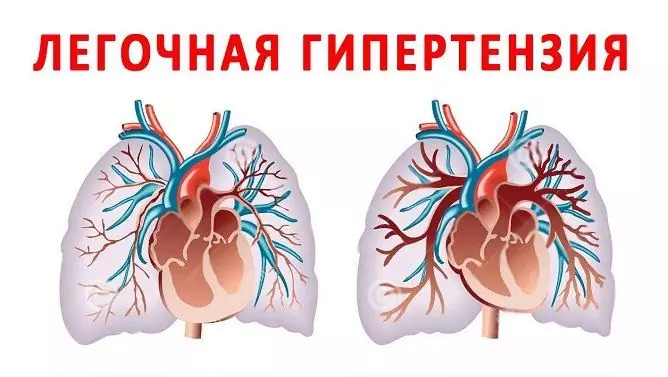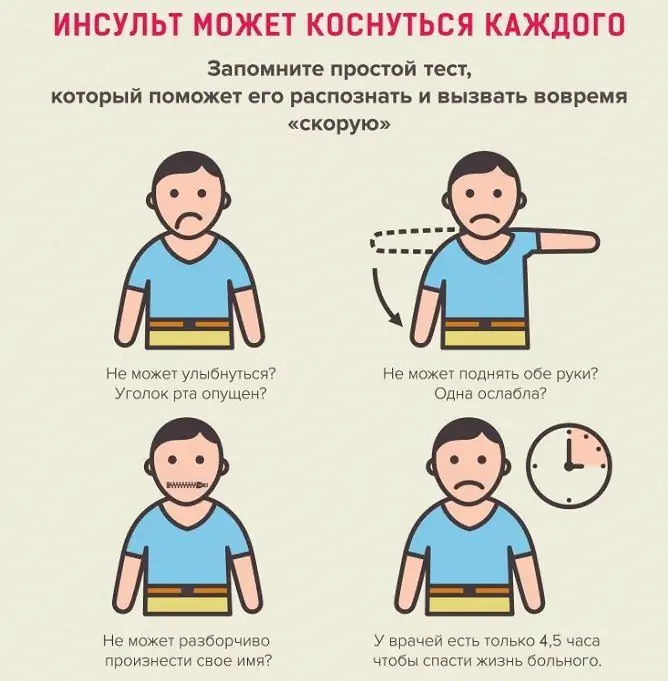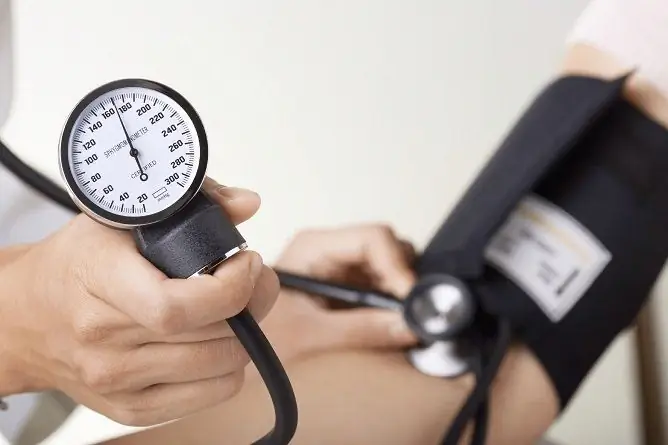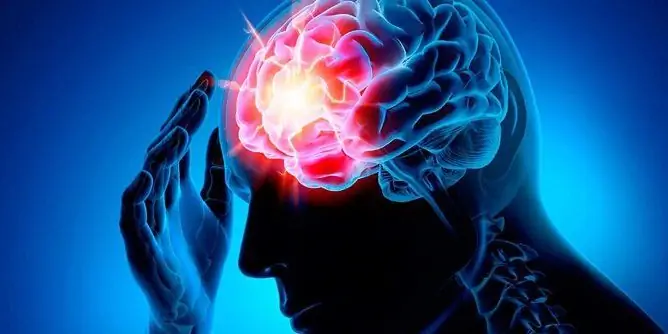- Author Rachel Wainwright [email protected].
- Public 2023-12-15 07:39.
- Last modified 2025-11-02 20:14.
Hypertension - what is it?
The content of the article:
- Hypertension causes
- Classification of the disease
- Signs of hypertension
- Diagnostics
- Treatment
- Prevention of hypertension
- Video
Hypertension, or hypertension, is the most common vascular disease, especially among those who are 50 and over. However, people suffer from it even at a young age, and sometimes even in childhood.
It should not be underestimated, after the first signs appear, you should consult a specialist, since the disease can progress quickly, increasing the risk of dangerous consequences, which include myocardial infarction and stroke.

Hypertension is a persistent increase in blood pressure, which can be caused by various reasons
Arterial hypertension is an increase in blood pressure (BP), it can be short-term or permanent. Hypertension is usually called a painful condition, which is characterized by a prolonged and persistent increase in blood pressure. Currently, the threshold value is considered to be 130/80 mm Hg. Art.
Most often, hypertension affects people after 50 years, but there are frequent cases of its occurrence in 30 years, and much earlier. At a young age, men are more likely to suffer, which is due to the lack of antihypertensive action in male hormones inherent in women.
Because of its prevalence, hypertension is often perceived as an unpleasant, but not too dangerous condition, but this is deeply mistaken. Why is this disease dangerous? The increase in pressure reaches truly life-threatening figures only after a few years, and sometimes decades of illness, but hypertension causes harm constantly. Constant hypertonicity of blood vessels leads to their degradation, and as a consequence - to disruption of blood supply to all tissues and organs in the body. Over time, this leads to their irreversible damage. Those organs that require abundant blood supply are affected faster than others - this is, first of all, the brain and heart, as well as the kidneys and the liver.
Hypertension causes
Hypertensive disease refers to polyetiological conditions, i.e., its occurrence can be due to many reasons. Essential and secondary hypertension is determined by origin. Essential, or hypertension proper, is 90-95% of all cases of hypertension. In this case, there are no traces of organic pathology, the increase in blood pressure occurs independently and primarily. The remaining cases of hypertension are mainly caused by impaired homeostasis associated with dysfunction of one of the blood pressure control systems. So, renal hypertension (impaired filtration and reabsorption, an increase in circulating blood volume and pressure) and endocrine hypertension associated with pathologies of the adrenal glands, thyroid gland, and pituitary gland are isolated.
There are risk factors that statistically increase the likelihood of developing the disease.
Obesity - increased body weight overloads the cardiovascular system; the blood supply to the heart becomes insufficient, it has to work harder to pump blood. The problem is aggravated by the fact that a large amount of fat in the blood with improper nutrition leads to atherosclerosis of the vessels.
Atherosclerosis - with it, the walls of elastic vessels of large and medium caliber acquire fat (cholesterol) deposits, which are then held together by fibrin, and a plaque is formed, which can be seen in the photo. The vessel damaged by atherosclerosis loses its elasticity and cannot perform its function of amortizing cardiac output, becomes fragile, and blood flow in it decreases due to plaques.

Atherosclerosis is one of the factors contributing to arterial hypertension.
A sedentary lifestyle - moderate physical activity serves as gymnastics for blood vessels, and in addition, activates blood flow, helping the heart. But if the heart and blood vessels do not receive the necessary load for a long time, not only their condition worsens (if they are inactive, muscle elements atrophy), but also the work of the vasomotor center in the brain is disrupted - it "weaned" to maintain the vessels in the correct way.
Age - the older the person, the higher the risk of the disease and the more difficult the treatment. With age, the elasticity of the fibers that provide the elasticity of the arteries is lost. Arteries compensate for cardiac output, and without an elastic wall, they lose this ability.
Stress and emotional stress - hypertension is directly related to psychosomatics, since prolonged emotional stress leads to disorders of innervation, and also stimulates the release of stress hormones - glucocorticoids, which increase blood pressure.
Gender - men are more likely to suffer from hypertension, since women have natural protection in the form of the sex hormones estrogen. Estrogens have a vasodilating effect and thus lower blood pressure.
Menopause - when estrogens cease to be produced in the required amount, their inhibitory pressure effect stops. Under the influence of acting etiological factors, this can become a starting point for arterial hypertension.
Pregnancy, especially its late terms - in the early stages, an increased amount of estrogen is produced, which often leads to hypotension of pregnant women, later this factor ceases to act. During pregnancy, the circulatory systems of the fetus and the mother are connected, an increase in pressure is possible both due to changes in hydrodynamic indicators caused by the pressure of the growing fetus on the vessels, and due to the ingress of biologically active substances into the bloodstream. Arterial hypertension in pregnant women is dangerous both for themselves and for the fetus, and therefore must be monitored by a doctor.
Excessive salt intake - sodium retains water in the nephrons of the kidneys, and this leads to an increase in the volume of circulating blood and, as a result, an increase in pressure.
Smoking - has an extremely negative effect on the state of blood vessels, especially the microvasculature; moreover, the substances contained in tobacco smoke stimulate the release of neurotransmitters into the blood.

Smoking over time leads to vascular damage and, as a result, to arterial hypertension
Alcohol abuse - immediately after drinking alcohol provides a short-term hypotensive effect, which is why many believe that it lowers blood pressure. However, after 15-20 minutes, it increases. Like tobacco, alcohol worsens the state of blood vessels, and in addition, causes damage to the kidneys, all together serves as a powerful impetus to the development of hypertension.
Classification of the disease
Arterial hypertension is divided into primary, which occurs independently, and makes up the majority of clinical cases, and secondary, which develops against the background of a certain disease.
Hypertension is also malignant and benign. A sign of good quality is the absence of damage to shock organs (target organs with the highest blood filling - kidneys, heart, brain, liver, lungs), its course without complications, uncomplicated hypertensive crises. Malignant progresses much faster, it is characterized by complicated crises, that is, those that are accompanied by damage to target organs, dysfunction. In this case, the risk of lethal complications is high, therefore the condition requires urgent care and pharmacological correction.
According to the degree of harm caused to the target organs, hypertension is divided into three stages:
- Stage 1 - the development of the disease is just beginning, microscopically, a change in the vascular wall, its swelling and increased permeability can be observed, but no visible damage is found in the target organs, their functions are preserved.
- Stage 2 - it is determined if damage to at least one target organ is detected. It can be a prolonged spasm, microhemorrhage, temporary dysfunction. Development of secondary diseases of the damaged organ should be expected against this background.
- Stage 3 is a terminal state, when the defeat of two or more target organs is combined with dangerous clinical manifestations of impairment of their functions. It can be dementia, retinopathy, liver failure, heart failure with high blood pressure.
By the presence of symptoms and the severity of their course, 4 degrees of hypertension are distinguished:
- Hypertension of 1 degree, or a mild form of the disease. The pressure occasionally exceeds 130 to 80 mm Hg. Art., but the clinical manifestations are hardly noticeable, although they are present - this is a headache, dizziness, tinnitus, flies before the eyes. But these manifestations usually only occur under stress or physical exertion.
- The disease of the 2nd degree progresses - traces of pathology appear in the target organs, for example, protein in the urine (kidney damage), pathological changes in the vessels of the fundus, interruptions in the work of the heart (arrhythmias, a feeling of strong beating or an imaginary stop), intense headaches, nausea, a feeling of pulsation in the head. Hypertensive crises appear - sudden attacks of pressure increase to high numbers, accompanied by a sharp deterioration in general condition.
- Grade 3 means a severe course of the disease, high blood pressure is constantly maintained and kept at normal values only by taking antihypertensive drugs. There is severe heart failure, possible pastiness, edema, arrhythmias, progressive deterioration of vision, complicated hypertensive crises. There is vascular insufficiency, hyperemia (redness) of the skin, the risk of stroke or heart attack is high. A hypertensive crisis requires hospital treatment.
- Grade 4 is an extremely severe state of complete decompensation that can only be stopped by massive pharmacological support. It is manifested by extremely high pressure, which does not decrease without drugs, damage to target organs leads to disruption of their functions. A grade 4 risk is associated with acute impairment of cerebral or coronary circulation.
Hypertensive disease of the 3rd degree can serve as a reason for the patient to receive disability. In this case, the answer to the question "are they taken to the army with such a diagnosis?" negative. In case of initial hypertension, the question of the possibility of conscription into the army is decided by a special commission.
Signs of hypertension
Symptoms of hypertension are associated with both compensatory reactions of the body to high blood pressure and damage to functionally important organs and systems. Typical symptoms of hypertension are:
- cerebral (cerebral) - dizziness, drowsiness, flies or dark spots before the eyes, headache, noise or ringing in the ears, nausea;
- cardiac - increased heart rate (tachycardia), arrhythmia, a feeling of cardiac arrest, weakness, chest pain, a feeling of incomplete inhalation, shortness of breath, cough, swelling in the arms and legs;
- somatic - an increase in body temperature, sweating, muscle weakness;
- visceral - nausea, vomiting, abdominal pain, squeezing, prolonged abdominal cramps.

A headache that is poorly relieved by analgesics may be a sign of hypertension
The first signs of arterial hypertension include headaches that are poorly controlled by analgesics, weakness and drowsiness, flies before the eyes, redness or an earthy complexion. Often there is a feeling of fullness in the head, pressure from the inside on the eyes. Despite the fact that such symptoms appear only from time to time, they should not be ignored, since it is this, the early stage of the disease that is best treated.
Diagnostics
To make a diagnosis, the doctor, first of all, collects an anamnesis, examines the patient, measures his pulse and blood pressure. Determination of blood pressure is carried out in a special way - first, the pressure is measured three times on each of the hands, and then the average is calculated. Then studies are carried out to clarify the diagnosis - general and biochemical blood tests, general urinalysis, electrocardiogram. Daily pressure monitoring is prescribed.
If necessary, other methods are included in the examination, for example, an electroencephalogram, magnetic resonance imaging of the brain, a study of blood hormones, etc.
Treatment
At the beginning of hypertension, there is not always a need for drug therapy; in many cases, lifestyle modifications are enough.
In the later stages, medication is necessary. A common mistake is that the patient considers it necessary to be treated only during a hypertensive crisis. In fact, drugs that stabilize blood pressure in advanced stages of hypertension must be taken continuously to keep blood pressure under control and prevent the development of crises, each of which is potentially life-threatening. Thus, the best way to reduce blood pressure in hypertension is to take pharmacological drugs prescribed by a doctor in a timely manner. As a rule, this is a complex in which, according to indications, angiotensin-converting enzyme blockers, calcium antagonists, diuretics, beta-blockers, etc. can be included.

Hypertension in the later stages requires drug therapy and medical supervision
How to reduce blood pressure quickly at home if antihypertensive drugs are not at hand? You can make a vinegar compress: Soak a cotton cloth with apple cider vinegar diluted with water (1: 1) and wrap your legs for 10 minutes. The vessels will expand, blood will flow into the lower extremities and the pressure will decrease. But this method is not a treatment for hypertension, it is only able to temporarily alleviate the patient's condition.
Prevention of hypertension
Prevention of the disease includes a mandatory change in lifestyle in a healthy direction. It is important to note that these same measures are a prerequisite for effective treatment - without changing the lifestyle, drug therapy can provide only a temporary result.
Often arterial hypertension is associated with stress, physical and emotional overload, lack of rest. Therefore, first of all, it is necessary to establish a mode of work and rest, to ensure a full night's sleep.
It is necessary to eliminate hypodynamia, the body should be subjected to regular physical activity, while overload should be avoided. Moderate exercise, dancing, swimming, long-distance walking - any option, as long as it is regular.
It is important to establish nutrition: to stop consuming large amounts of salt, unhealthy fats, high-calorie foods, and tonic drinks. Spicy and salty foods should be avoided from the diet. Obese people need to normalize their body weight and maintain it at a healthy level.
It is imperative to resolutely give up bad habits.
People who are at risk for hypertension should have their blood pressure checked regularly. It is important for hypertensive patients to take medications on schedule, and also remember that any changes in therapy can only be made by the attending physician.
Video
We offer for viewing a video on the topic of the article.

Nikita Gaidukov About the author
Education: 4th year student of the Faculty of Medicine No. 1, specializing in General Medicine, Vinnitsa National Medical University. N. I. Pirogov.
Work experience: Nurse of the cardiology department of the Tyachiv Regional Hospital No. 1, geneticist / molecular biologist in the Polymerase Chain Reaction Laboratory at VNMU named after N. I. Pirogov.
The information is generalized and provided for informational purposes only. At the first sign of illness, see your doctor. Self-medication is hazardous to health!






